- Home
- James Rollins
The Last Oracle (2008) sf-5
The Last Oracle (2008) sf-5 Read online
The Last Oracle (2008)
( Sigma Force - 5 )
James Rollins
In Washington, D.C., a homeless man takes an assassin's bullet and dies in Commander Gray Pierce's arms. A bloody coin clutched in the dead man's hand?an ancient relic that can be traced back to the Greek Oracle of Delphi?is the key to a conspiracy that dates back to the Cold War and threatens the very foundation of humanity. For what if it were possible to bioengineer the next great prophet?a new Buddha, Muhammad, or even Jesus? Would this Second Coming be a boon . . . or would it initiate a chain reaction that would result in the extinction of humankind? Vital seconds are ticking rapidly away as Pierce races across the globe in search of answers, one step ahead of ruthless killers determined to reclaim the priceless artifact. Suddenly the future of all things is balanced on the brink between heaven and hell?and salvation or destruction rests in the hands of remarkable children. Will the past be enough to save the future?
The Last Oracle
James Rollins
*
FROM THE HISTORICAL RECORD
The greatest blessings granted to mankind come by way of madness, which is a divine gift.
SOCRATES, ON THE ORACLE OF DELPHI
Ancient Greeks, with their pantheon of gods, held an abiding belief in the powers of prophecy. They revered those who could read the portents in the entrails of goats, who saw the future in the rising smoke of a sacrificial fire, who predicted events based on the auguries of tossed bones. But one individual was held in the highest esteem: the mystical Oracle of Delphi.
For almost two thousand years, a succession of closely guarded women resided within the temple to Apollo on the slopes of Mount Parnassus. Each generation, a single woman ascended to the seat of prophecy and took the name Pythia. While under a vapor-induced trance, she answered questions about the future from the mundane to the profound.
Her admirers included leading figures of Greek and Roman history: Plato,
Sophocles, Aristotle, Plutarch, Ovid. Even early Christians revered her.
Michelangelo painted her prominently on the ceiling of the Sistine Chapel, foretelling the coming of Christ.
But was she a charlatan, duping the masses with cryptic answers? No matter the truth, one fact is beyond dispute. Revered by kings and conquerors across the ancient world, Pythia's prophecies changed the course of human history.
And while much about her remains shrouded in mystery and mythology, one truth has emerged. In 2001, archaeologists and geologists discovered a strange alignment of tectonic plates under Mount Parnassus that has been shown to vent hydrocarbon gases, including ethylene, which is capable of inducing a trancelike euphoria and hallucinations, the very vapors described in the historical record.
So while science has discovered one of Pythia's secrets, the ultimate truth remains unknown:
Did the Oracle truly foresee the future? Or was it divine madness?
Man, know thyself, and thou wilt know the universe and the gods.
INSCRIPTION AT THE TEMPLE OF DELPHI
A. D. 398
Mount Parnassus Greece
They had come to slay her.
The woman stood at the temple's portico. She shivered in her thin garment, a simple shift of white linen belted at the waist, but it was not the cold of predawn that iced her bones.
Below, a torchlight procession flowed up the slopes of Mount Parnassus like a river of fire. It followed the stone-paved road of the Sacred Way, climbing in switchbacks up toward the temple of Apollo. The beat of sword on shield accompanied their progress, a full cohort of the Roman legion, five hundred strong. The road wound through broken monuments and long-ransacked treasuries.
Whatever could burn had been set to torch.
As the firelight danced over the ruins, the flames cast a shimmering illusion of better times, a fiery restoration of former glory: treasuries overflowing with gold and jewels, legions of statues carved by the finest artisans, milling crowds gathered to hear the prophetic words of the Oracle.
But no more.
Over the past century, Delphi had been brought low by invading Gauls, by plundering Thracians, but most of all, by neglect. Few now came to seek the words of the Oracle: a goat herder questioning a wife's fidelity, or a sailor seeking good omens for a voyage across the Gulf of Corinth.
It was the end of times, the end of the Oracle of Delphi. After prophesying for thirty years, she would be the last to bear the name Pythia.
The last Oracle of Delphi.
But with this burden came one final challenge.
Pythia turned toward the east, where the sky had begun to lighten.
Oh, that rosy Eos, goddess of dawn, would hurry Apollo to tether his four horses to his Sun chariot.
One of Pythia's sisters, a young acolyte, stepped out of the temple behind her.
Mistress, come away with us, the younger woman begged. It is not too late. We can still escape with the others to the high caves.
Pythia placed a reassuring hand on the woman's shoulder. Over the past night, the other women had fled to the rugged heights where the caves of Dionysus would keep them safe. But Pythia had a final duty here.
Mistress, surely there is no time to perform this last prophecy.
I must.
Then do it now. Before it is too late.
Pythia turned away. We must wait for dawn of the seventh day. That is our way.
As the sun had set last night, Pythia had begun her preparations. She had bathed in Castilia's silver spring, drank from the Kassotis spring, and burned bay leaves on an altar of black marble outside the temple. She had followed the ritual precisely, the same as the first Pythia thousands of years ago.
Only this time, the Oracle had not been alone in her purifications.
At her side had been a girl, barely past her twelfth summer.
Such a small creature and of such strange manner.
The child had simply stood naked in the spring waters while the older woman had washed and anointed her. She'd said not a word, merely stood with an arm out, opening and closing her fingers, as if grasping for something only she could see. What god so suffered the child, yet blessed her just the same? Surely not even Apollo. Yet the child's words thirty days ago could come only from the gods. Words that had plainly spread and stoked the fires that now climbed toward
Delphi.
Oh, that the child had never been brought here.
Pythia had been content to allow Delphi to fade into obscurity. She remembered the words spoken by one of her predecessors, long dead for centuries, an ominous portent.
Emperor Augustus had asked of her dead sister, Why has the Oracle grown so silent?
Her sister had responded, A Hebrew boy, a god who rules among the blessed, bids me leave this house
Those words proved to be a true prophecy. The cult of Christ rose to consume the empire and destroyed any hope for a return to the old ways.
Then a moon ago, the strange girl had been brought to her steps.
Pythia glanced away from the flames and toward the adytum, the inner sanctum of
Apollo's temple. The girl waited inside.
She was an orphan from the distant township of Chios. Over the ages, many had hauled such children here, seeking to abandon such burdens upon the sisterhood.
Most were turned away. Only the most ideal girls were allowed to stay: straight of limb, clear of eye, and unspoiled. Apollo would never accept a vessel of lesser quality for his prophetic spirit.
So when this willow branch of a girl had been presented naked to the steps of
Apollo's temple, Pythia had given her hardly a glance. The child was unkempt, her dark hair knotted and tangled, her skin marked with pox scars. Bu
t deeper,
Pythia had sensed something wrong with the child. The way she rocked back and forth. Even her eyes stared without truly seeing.
Her patrons had claimed the child was touched by the gods. That she could tell the number of olives in a tree with merely a glance, that she could declare when a sheep would lamb with but a touch of her hand.
Upon hearing such stories, Pythia's interest had stirred. She called the girl to join her at the entrance to the temple. The child obeyed, but she moved as if disconnected, as if the winds themselves propelled her upward. Pythia had to draw her by hand to sit on the top step.
Can you tell me your name? she asked the thin child.
Her name is Anthea, one of her patrons declared from below.
Pythia kept her gaze focused on the child. Anthea, do you know why you've been brought here?
Your house is empty, the child finally mumbled to the floor.
So at least she can speak. Pythia glanced to the temple's interior. The hearth fire burned in the center of the main hall. It was indeed empty at the moment, but the child's words seemed to whisper at something more.
Maybe it was her manner. So strange, so distant, as if she stood with one leg in this world and the other beyond this realm.
The child glanced up with those clear blue eyes, so full of innocence, so in contrast with what spilled next from her lips.
You are old. You will die soon.
From below, her patron attempted to scold her, but Pythia kept her words soft.
We all die eventually, Anthea. It is the order of the world.
She shook her head. Not the Hebrew boy.
Those strange eyes bored into her. The hairs along Pythia's arms shivered.
Plainly the girl had been taught the catechism of the cult of Christ and his bloody cross. But her words again. Such strange cadence.
The Hebrew boy
It reminded her of her ancestor's prophecy of doom.
But another will come, the girl continued. Another boy.
Another boy? Pythia leaned closer. Who? From where?
From my dreams. The girl rubbed the heel of one hand at her ear.
Sensing there were depths to the girl that remained untapped, Pythia plumbed them. This boy? she asked. Who is he?
What the child said next drew a gasp from the gathered crowd even they recognized blasphemy when they heard it.
He is the brother of the Hebrew boy. The child then clasped tight to the hem of Pythia's skirt. He burns in my dreams and he will burn everything. Nothing will last. Not even Rome.
For the past month, Pythia had attempted to learn more of this doom, even taking the girl into the sisterhood's fold. But the child had seemed only to retreat into herself, going mute. Still, there was one way to learn more.
If the girl were truly blessed, the power of Apollo's breath his prophetic vapors might burn free what was locked within the girl's strangeness.
But was there enough time?
A touch to her elbow interrupted her reverie and drew her back to the present.
Mistress, the sun , her younger sister urged.
Pythia focused to the east. The eastern skies blazed, heralding the coming sunrise. Below, shouts rose from the Roman legion. Word of the girl had spread.
Prophecies of doom had traveled far even to the ears of the emperor. An Imperial courier had demanded the child be delivered to Rome, declaring her demon-plagued.
Pythia had refused. The gods had sent this child to her threshold, to Apollo's temple. Pythia would not relinquish the girl without first testing her, putting her to the question.
To the east, the first rays of the sun etched the morning skies.
The seventh day of the seventh month dawned.
They had waited long enough.
Pythia turned her back on the fiery legion. Come. We must hurry.
She swept into the temple's interior. Flames greeted her here, too, but they were the welcoming warmth from the temple's sacred hearth. Two of her elder sisters still tended the flames, too old to make the harsh climb up to the caves.
She nodded her gratitude to each in turn, then hurried past the hearth.
At the back of the temple, stairs led down toward the private sanctum. Only those who served the Oracle were allowed to enter the subterranean adytum. As she descended, marble turned to raw limestone. The stairs emptied into a small cavern. The cave had been discovered ages ago by a goat herder, who upon nearing the cavern opening, fell under the sway of Apollo's sweet-smelling vapors and succumbed to strange visions.
Would that such gifts last one more sunrise.
Pythia found the child waiting inside the cave. The girl was dressed in an alb too large for her and sat cross-legged beside the bronze tripod that supported the sacred omphalos, a waist-high domed rock that represented the navel of the world, the center of the universe.
The only other decoration in the cave was a single raised seat, resting on three legs. It stood over a natural crack in the floor. Pythia, long accustomed to
Apollo's vapor, was still struck by the scent rising from below, smelling of almond blossoms.
The god's pneuma, his prophetic exhalation.
It is time, she said to the younger sister, who had followed her down. Bring the child to me.
Pythia crossed to the tripod and mounted the seat. Positioned over the crack in the floor, the rising vapors bathed her in Apollo's breath. Hurry.
The younger sister gathered up the child and placed the girl into her lap.
Pythia cradled her gently, like a mother with a babe, but the child did not respond to such affection.
Pythia already felt the effect of the pneuma rising from the earth below her. A familiar tingle ran along her limbs. Her throat burned warmly as Apollo entered her. Her vision began to close.
But the child was smaller, more susceptible to the pneuma.
The girl's head rolled back; her eyelids drooped. Surely she would not survive
Apollo's penetration for long. Still, if there was to be any hope, the girl had to be put to the question.
Child, Pythia rang out, tell us more of this boy and the doom he whispered to you. Where will he rise?
The small lips moved in a whisper. From me. From my dreams.
Small fingers found Pythia's hand and squeezed.
Words continued to spill from the girl's lips. Your house is empty your springs have dried up. But a new spring of prophecy will flow.
Pythia's arms tightened on the girl. For too long, ruin had lingered over the temple. A new spring. Hope rang in her voice. Here at Delphi?
No
Pythia's breath grew more rapid. Then from where will it spring?
The girl's lips moved, but no words came out.
She shook the girl. Where?
The girl lifted a boneless arm and placed a hand on her own belly.
With that touch, a vision swelled through Pythia, of silver waters gushing from the girl's navel, from out of her womb. A new spring. But was it a vision from
Apollo? Or was it born from her own hope?
A scream pierced her daze. Hard voices echoed down. From the stairs, a figure stumbled into view. It was one of the elders who had tended the fire. She clutched a hand to her shoulder. A crimson bloom spread from under her palm. The black head of an arrow protruded between her fingers.
Too late, the old woman cried out and collapsed to her knees. The Romans
Pythia heard the woman's words but remained lost in the vapors. Behind her eyes, she pictured the spring flowing from the girl, a new font of prophetic power.
But Pythia also smelled the smoke from the Roman torches. Blood and smoke leaked into her vision. The silver spring now ran with a thin stream of black crimson and swept into the future.
The child suddenly sagged in her arms, completely lost to the pneuma's vapors.
Still, as Pythia studied the vision, she watched the dark stream form a black figure the shadow of a boy. Flames rose behind him.
The child's words from a moon ago echoed to her.
The brother of the Hebrew boy he who would set fire to the world.
Pythia held the limp girl. The child's prophecy hinted at both doom and salvation. Perhaps it would be best to leave her to the Imperial legion, to end such an uncertain future here. From overhead, hard voices echoed down. There was already no escape. Except in death.
Still, the vision swelled in her.
Apollo had sent the child. To Pythia.
A new spring will flow.
She took a deep breath, drawing Apollo fully into her.
What must I do?
The Roman centurion crossed the hall. He had his orders. To slay the girl who spoke of the empire's doom. Last night, they had captured one of the temple's servants, a maid. Under the lash and before he gave her to his men she let it be known that the child still remained at the temple.
Bring the torches! he yelled. Search every corner!
Movement near the back of the hall drew his eye and his sword.
A woman appeared from the shadows of a lower stair. She stumbled forward, weaving two steps into view, unsteady, dazed. Dressed all in white, she bore a crown of laurel branches.
He knew who stood before him.
The Oracle of Delphi.
The centurion fought back a tremble of fear. Like many of the legion, he still secretly practiced the old ways. Even slaughtered bulls to Mithra and bathed in their blood.
Still, a new sun was on the rise.
There was no stopping it.
Who dares violate Apollo's temple? she called out to them.
With the stony weight of his men's eyes upon him, the centurion marched to face the woman. Bring forth the girl! he demanded.
She is gone. Beyond even your reach.
The centurion knew that was impossible. The temple was surrounded.
Still, worry pushed him forward.
The Oracle stepped to block him from the stairs. She held a palm against his breastplate. The adytum below is forbidden to all men.
But not to the emperor. And I am under his edict.
She refused to move. You will not pass.
The centurion had his orders under the seal of Emperor Theodosius, handed to him personally by the emperor's son Arcadius. The old gods were to be silenced, their old temples torn down. All across the empire, including Delphi. The centurion had been given one additional command.

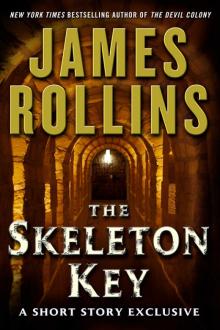 The Skeleton Key
The Skeleton Key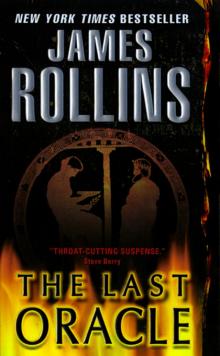 The Last Oracle
The Last Oracle The Judas Strain
The Judas Strain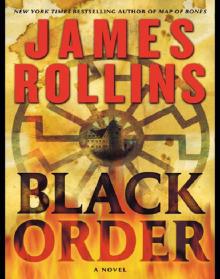 Black Order
Black Order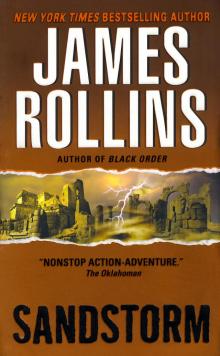 Sandstorm
Sandstorm Ghost Ship
Ghost Ship The Devil Colony
The Devil Colony Subterranean
Subterranean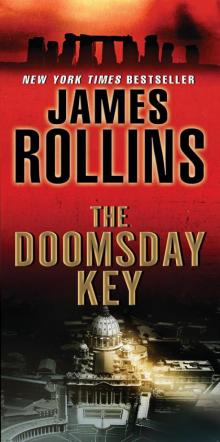 The Doomsday Key
The Doomsday Key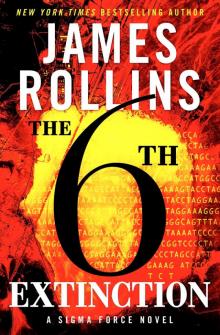 The 6th Extinction
The 6th Extinction Bloodline
Bloodline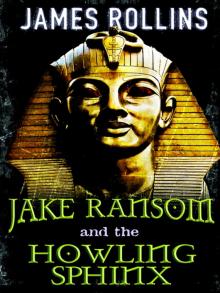 Jake Ransom and the Howling Sphinx
Jake Ransom and the Howling Sphinx The Midnight Watch
The Midnight Watch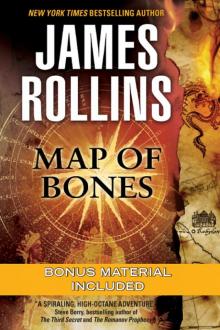 Map of Bones
Map of Bones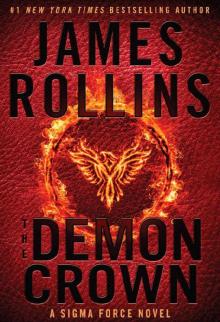 The Demon Crown
The Demon Crown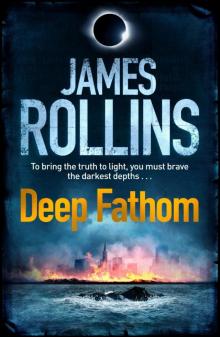 Deep Fathom
Deep Fathom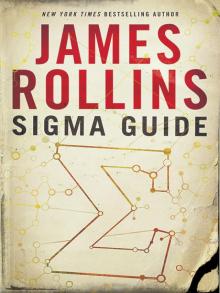 Sigma Guide
Sigma Guide Kowalski's in Love
Kowalski's in Love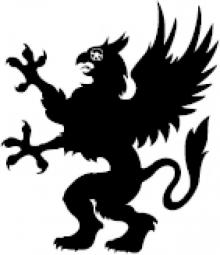 Jake Ransom and the Skull King's Shadow
Jake Ransom and the Skull King's Shadow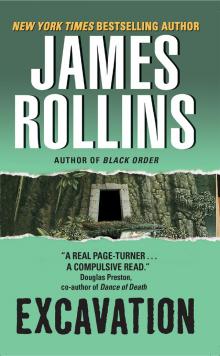 Excavation
Excavation The Seventh Plague
The Seventh Plague Altar of Eden
Altar of Eden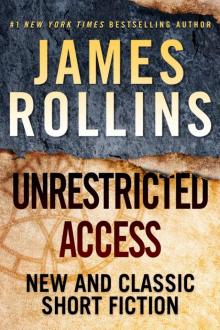 Unrestricted Access: New and Classic Short Fiction
Unrestricted Access: New and Classic Short Fiction Indiana Jones and the Kingdom of the Crystal Skull
Indiana Jones and the Kingdom of the Crystal Skull Crucible
Crucible The Eye of God
The Eye of God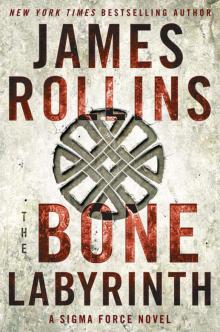 The Bone Labyrinth
The Bone Labyrinth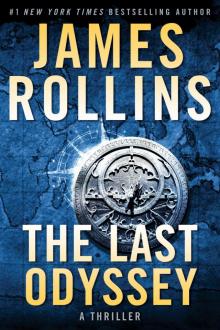 The Last Odyssey: A Thriller
The Last Odyssey: A Thriller Unrestricted Access
Unrestricted Access Amazonia
Amazonia Blood Brothers: A Short Story Exclusive
Blood Brothers: A Short Story Exclusive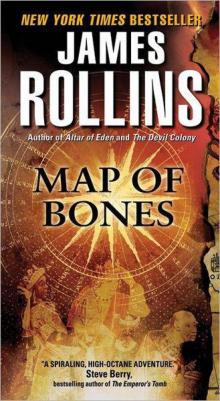 Map of Bones: A Sigma Force Novel
Map of Bones: A Sigma Force Novel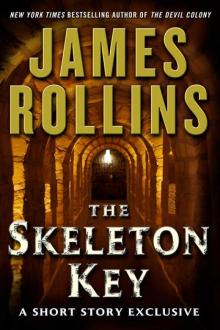 The Skeleton Key (sigma force)
The Skeleton Key (sigma force)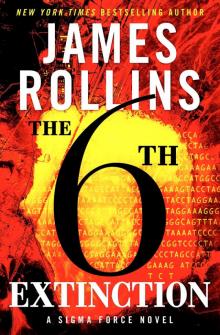 Sigma Force 10 - The Sixth Extinction
Sigma Force 10 - The Sixth Extinction Innocent Blood
Innocent Blood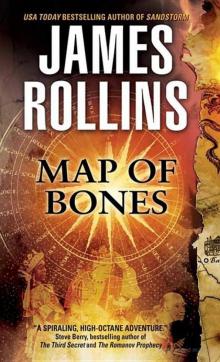 Map of Bones sf-2
Map of Bones sf-2 The Eye of God: A Sigma Force Novel
The Eye of God: A Sigma Force Novel The Eye of God: A Sigma Force Novel sf-9
The Eye of God: A Sigma Force Novel sf-9 The Pit
The Pit Indiana Jones and the The Kingdom Of The Crystal Skull
Indiana Jones and the The Kingdom Of The Crystal Skull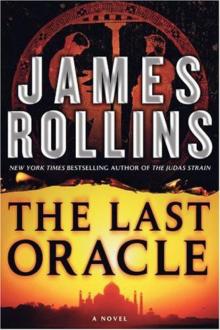 The Last Oracle (2008) sf-5
The Last Oracle (2008) sf-5 City of Screams
City of Screams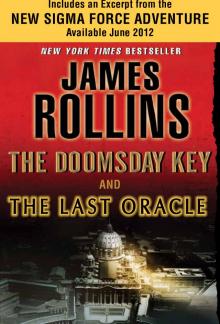 The Doomsday Key and The Last Oracle with Bonus Excerpts
The Doomsday Key and The Last Oracle with Bonus Excerpts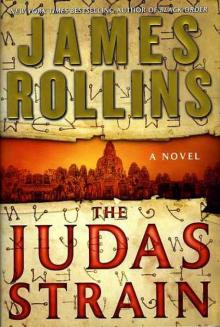 The Judas Strain sf-4
The Judas Strain sf-4 Blood Infernal
Blood Infernal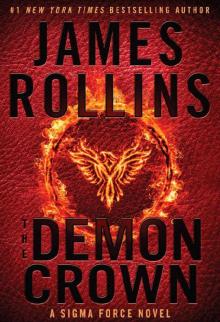 The Demon Crown: A Sigma Force Novel
The Demon Crown: A Sigma Force Novel War Hawk: A Tucker Wayne Novel
War Hawk: A Tucker Wayne Novel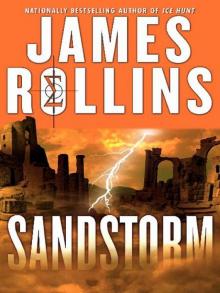 SANDSTORM sf-1
SANDSTORM sf-1 Bloodline: A Sigma Force Novel
Bloodline: A Sigma Force Novel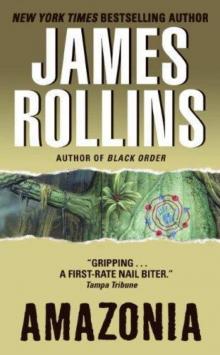 Amazonia: a novel
Amazonia: a novel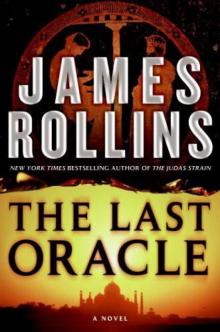 The Last Oracle: A Sigma Force Novel
The Last Oracle: A Sigma Force Novel City of Screams (the order of the sanguines)
City of Screams (the order of the sanguines) Ghost Ship: A Sigma Force Short Story
Ghost Ship: A Sigma Force Short Story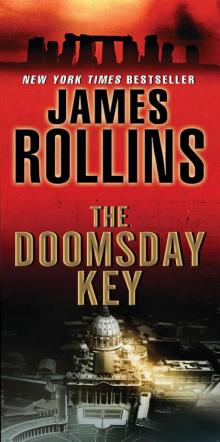 The Doomsday Key: A Sigma Force Novel
The Doomsday Key: A Sigma Force Novel